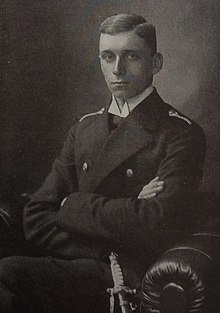Wolfgang Zenker (officer)
Richard Otto Wolfgang Zenker (born August 11, 1898 in Leipzig , † November 8, 1918 in Kiel-Wik ) was a German officer at sea .
Life
family
Wolfgang Zenker came from a respected Leipzig family. His great-grandfather was the businessman and city councilor Ludwig Zenker (1797–1842), his grandfather, Oskar Zenker (1837–1895), was deputy chairman of the Leipzig city council for many years. His father, the merchant Paul Zenker (1867-1933), had married in 1896 Helene Dumas (1875-1946), the mother of the Leipzig banking family came from Küstner. His uncle was the painter Georg Zenker .
education
Wolfgang grew up with his older brother Rudolf (1897–1939) and younger brother Theodor (1906–1975) in Leipzig. After attending the second higher citizen school , he moved to King Albert Grammar School , where he on July 4, 1916 as Oberprimaner the Notabitur existed.
The musically gifted student joined the Imperial Navy in 1916 as a midshipman .
After completing basic military training in Kiel and on the training ship SMS Freya , he was assigned to the SMS König . In April 1917 he was made an ensign . For his participation in the Albion company in October 1917, he was awarded the Iron Cross 2nd class.
In July 1918, Zenker took part in a navigation course at the Mürwik naval base . After successfully passing the officer's examination, he was promoted to lieutenant at sea in early October 1918 .
death
After passing the officer's examination, Zenker went on a three-week home leave. At the end of October he returned to his ship, which at the time was in the port of Kiel, awaiting a command to take part in a submarine instruction course.
During the Kiel sailors' uprising , Wolfgang Zenker was the officer on watch on board the SMS König. Since the evening of November 4, 1918, with the exception of SMS König, all ships in the port of Kiel carried the rebels' red flag. When, early in the morning of November 5, 1918, Captain Karl Less refused the workers 'and soldiers' council's request to hoist the red flag on the SMS König, it was announced that they wanted to enforce this demand by force. At 7:30 a.m., the commanding officer gave his officers the order to set and defend the imperial flag of war at 7:40 a.m. Wolfgang Zenker stood next to the flag as the officer on watch. In the port, in the shipyard and the surrounding ships, the setting of the war flag caused great unrest. Shots were fired from land, one of which hit Lieutenant Zenker, who then collapsed and was taken to the fortress hospital in Kiel-Wik . Doctors diagnosed a gunshot in the chest to the left of the right armpit that punctured the lungs, injured the spinal cord and paralyzed the lower body. On the morning of November 8th, Zenker lost consciousness due to pneumonia and died of the effects of his wound at noon. On November 21, the funeral service took place in Leipzig, which was led by an uncle of the 2nd degree, the consistorial councilor Walther Zenker (1864–1932), superintendent at the St. Peter's Church in Leipzig . The ashes of Wolfgang Zenker were buried at a later date in Leipzig's southern cemetery.
Aftertaste
The death of those SMS König officers shot by rebels aroused great sympathy among contemporaries. The workers 'and soldiers' council also condemned the bloodshed and expressed its regret over the death of the young officers. Zenker's family commemorated their son, who died early, with a privately commissioned memorial tape. In 1937 the lawyer Rudolf Hintze published a biography about Wolfgang Zenker. In the same year, the name Wolfgang Zenker was added to the German destroyer Z 9 . A second destroyer was named after the fallen Corvette Captain of the SMS König Bruno Heinemann. From 1937 to 1947 a street in Leipzig-Schönefeld was named after Wolfgang Zenker.
gallery
literature
- Paul Zenker: Wolfgang Zenker. Born on August 11, 1898 in Leipzig, died on November 8, 1918 in Kiel . Private print, Leipzig 1918.
- Rudolf Hintze: Lieutenant to the Sea Wolfgang Zenker. A German war fate . Adolf Klein Verlag, Leipzig 1937.
Web links
Individual evidence
- ↑ Karl Theodor von Küstner was her great-uncle.
- ↑ He received violin lessons from the concertmaster Emil Kolb and worked as a violinist and violist in chamber music performances.
- ↑ Captain Less was hit by a total of four shots and survived. Corvette Captain Bruno Heinemann, who wanted to help Captain Less, was hit by a ricochet and died on the same day.
- ↑ See references.
- ↑ Current name: Wuttkestrasse
| personal data | |
|---|---|
| SURNAME | Zenker, Wolfgang |
| ALTERNATIVE NAMES | Zenker, Richard Otto Wolfgang (full name) |
| BRIEF DESCRIPTION | German lieutenant at sea |
| DATE OF BIRTH | August 11, 1898 |
| PLACE OF BIRTH | Leipzig |
| DATE OF DEATH | November 5, 1918 |
| Place of death | Kiel-Wik |





